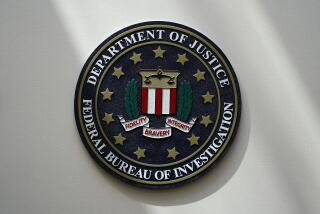Al Qaeda Imprint Debated
- Share via
WASHINGTON — For U.S. and British authorities, it is not surprising that a group of militants would plot terrorist attacks about the time of the fifth anniversary of the Sept. 11 strikes on the World Trade Center and the Pentagon.
But authorities are still not sure whether they think the alleged plot to blow up as many as 10 airliners over the Atlantic Ocean was the work of Al Qaeda or an operation launched by British citizens of Pakistani descent.
The most likely answer is that the alleged conspiracy was a potent combination of the two, with at least one dangerous Pakistani militant organization thrown into the mix as well, according to intelligence and law enforcement officials here and abroad.
“There hasn’t been anyone in a long time who is serious about this stuff who thinks it begins and ends with Al Qaeda,” one U.S. intelligence official said. “You are dealing with a complex picture with a lot of actors. People [in the U.S. government] are looking at all of the possibilities, as are our counterparts” in Britain.
Most, if not all, of the suspects are British nationals of Pakistani descent, at least some of whom had ties to radical fundamentalists in Pakistan, U.S. officials said. At least one had traveled to Pakistan, they said.
“As to whether this is Al Qaeda central or not, there is some ambiguity there,” said the U.S. intelligence official, who did not want to be named because the investigation is ongoing. “There are hallmarks, yes. But all of the threads have not been picked up yet, and one can’t say definitively at this point that it points back to Al Qaeda central.”
Authorities are pursuing a more comprehensive theory: that the alleged plotters may have been following the model of London militants who blew up several subway stations and a bus last summer, killing 52 people and injuring at least 700.
In that case, one of the four lead plotters, Mohamed Sidique Khan, traveled extensively to Pakistan and is believed to have trained in guerrilla camps there. But he was never connected conclusively to Al Qaeda, even though he appeared in one of the organization’s promotional videos.
Authorities say Khan in all likelihood trained in camps run by Lashkar-e-Taiba or Jaish-e-Muhammad, two militant groups considered to be feeder organizations providing Al Qaeda with a wellspring of recruits, as well as money and logistical support.
And authorities believe a second subway plotter, Shahzad Tanweer, also traveled to Pakistan, met with officials of both militant organizations and spread the word among friends when he got back to Britain.
One senior FBI counter-terrorism official said authorities had detected a similar pattern in other countries, as militants travel to Pakistan, receive training from the two groups and return to their homelands bent on launching attacks.
In some cases, the camps are run in tandem by the militant groups and Al Qaeda, said the official, who spoke on condition of anonymity because the investigation is continuing.
“Some went to the camps and came back and started their own little groups, and those in turn started other cells, so it’s sometimes impossible to tell where to draw the lines” between Al Qaeda, the two militant Pakistan groups and homegrown militants, the FBI official said.
U.S. authorities think the groups have tens of thousands of followers throughout Pakistan, and many hundreds of them have gone on to become operational soldiers and leaders of Al Qaeda.
But even as Pakistan has clamped down on Al Qaeda, militant groups have operated with virtual impunity, changing their names occasionally to avoid government crackdowns.
The result, U.S. officials and outside experts say, is that the militant groups have taken over many of Al Qaeda’s core functions -- recruiting, radicalizing and training militants for attacks against the West.
Initially, the groups were dedicated specifically to the fight against India over the disputed territory in Kashmir. But in recent years, they have begun training jihadists who want to attack the United States and Western interests, U.S. officials and outside experts said.
“Pakistan has not yet fully dismantled the training infrastructure of the various jihadi groups,” said Husain Haqqani, an author and former senior advisor to three Pakistani leaders. “And in the post 9/11 environment, if a person feels inspired by Al Qaeda and wants to get training and act on his own or as part of a small group, Pakistan still remains a viable place for him to find the means to be a terrorist.”
The jihadi groups serve as conduits for Al Qaeda, said Haqqani, a professor of international relations at Boston University.
“They do the training, they help people move through Pakistan and into contact with Al Qaeda,” he said. “Now all you need is a basement or a back room to learn how to mix explosives and how to use household items for terrorist purposes.”
Lashkar-e-Taiba, or LET as it is known, was linked to an alleged terrorist plot in Canada in which authorities arrested at least 17 men in June on suspicion of planning attacks against government facilities. An 18th man was arrested last week.
Two Atlanta men linked to the Canada case were planning to visit LET camps in Pakistan for jihad training, authorities have said.
In another case, suspects in what prosecutors called the “Virginia jihad network” in the Washington area had connections to LET. Eleven young Muslim men, who trained in part through paintball games, were accused of conspiring to commit offenses against the U.S. This year, nine of the 11 were convicted or pleaded guilty, receiving prison sentences of as much as 20 years.
On Thursday, Pakistan’s government put Hafiz Mohammed Saeed, Lashkar-e-Taiba’s founder, under house arrest. Authorities in Pakistan and Washington would not say whether the house arrest was connected to the alleged plot in Britain or to recent terrorist acts in India, including the deadly Mumbai bombings last month.
Saeed founded Lashkar-e-Taiba in the mid-1990s. It has been declared a terrorist organization by Pakistan and United States, and its assets have been frozen.
But in a bid to avoid government restrictions, Saeed later formed Jamaat ud-Dawa, which Washington listed as a terrorist organization this year even though it operates legally in Pakistan.
More to Read
Sign up for Essential California
The most important California stories and recommendations in your inbox every morning.
You may occasionally receive promotional content from the Los Angeles Times.













